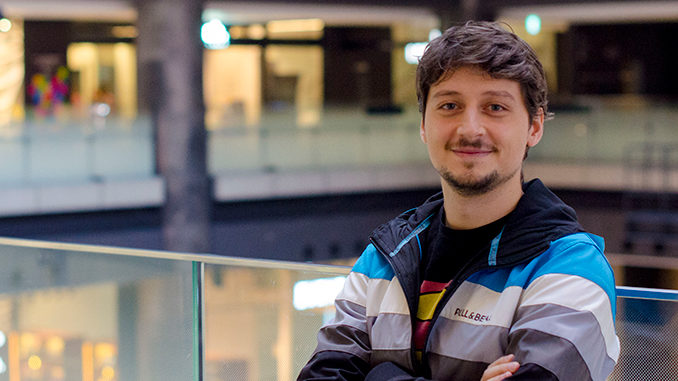
I met Tugi the same day I met Ricky, at an SPI networking event. I just finished reading a book about networking, and it suggested rather than simply going to networking events – you should become an organizer for events yourself. I saw Tugi taking pictures of the event. I knew he was one of the organizers and I had a good feeling about this SPI group, so I just went for it and asked if I could help out.
Tugi was friendly from the very beginning. Over time I’ve come to know that that’s just the way he is. He has this constant relaxed demeanor and is quick to give you a smile.
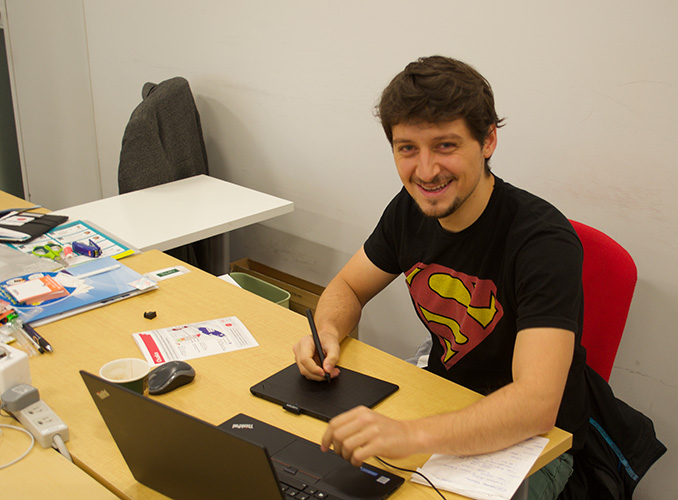
Where did you grow up?
Born in Switzerland to a Turkish family and raised in a rural village in the German speaking part of Switzerland. It’s a very small village of about 2000 people but well located between the major cities Zurich, Basel and Bern. My parents are from Turkey and spent their youth there, so I grew up between two cultures, which turned out to be good and sometimes bad. I was exposed to the Swiss culture with my friends at school, and the Turkish culture with family and other friends. Whereas I see some people tend to end up with one or the other, I kind of made my way through both. It opened up a lot of opportunities for me, in the sense of you get an understanding of different viewpoints and different cultures, and different peoples reasoning for certain actions. That was a cool thing, to see and live two very different mindsets.
Is it common to be multi-cultural in Switzerland?
Well, if you look at Switzerland, it’s between borders of Germany, Austria, Italy, France.. I hope I’m not leaving out anyone (Edit: he left out Liechtenstein). So already, you have quite a cross over mix where even the Swiss national language is not 1 but 4 languages. So we have German speakers as the majority with 60%, French speakers with about 25%, and then we have a minority of Italian speaking people, and a very very low amount of Romansh speakers. You might have to look that up haha. The fun thing though is that the Swiss government still features all the languages, and they even have a super small special language tv programs. In that sense, Switzerland has always been a cross-over of different things. There are also a lot of refugees from various regions. When I was growing up, we had quite an influx of Balkan people in my region – from Turkey, Albania, Kosovo, Serbia – for various reasons. In my case, it was my grandpa who moved to Switzerland for work reasons.

What languages do you speak?
I consider German as my native language. Then we have the Swiss German. I don’t know if you can count it as an individual language but it is very distinct. Switzerland has many dialects, depending on the cities and region you are in, they change. It took some study friends from Germany like 3 to 4 months to fully understand us. As the second biggest official language is French, of course we had to learn that at school too. In the German part of Switzerland you learn French. The native French speaking Swiss learn German. I should technically be able to speak in French. It’s somewhere up there in my brain, but I never practice that much. But it’s there.
Due to my background and family, I also know basic Turkish. Daily talks, no problem. Sophisticated talks, I can understand, but not respond on the same level. And obviously English, through school, movies, games. That’s more or less it.
And well.. Nihongo.. mm not really, but eventually hopefully haha.
What feelings led you to wanting to leave Switzerland?
One of the reasons was because you grow up in this one area, you only see one thing. Switzerland is not that big although we have a lot of cultural differences. It’s still Switzerland. At some point you think maybe I should see something else. I was also told by companies I was applying to like “Oh, we like you’re background and this and that, but you kind of lack foreign experience.” I said well let’s do that. I also had other motivations, and I’ve had some experience before in Japan as a tourist. Plus growing up in the 80s and 90s, there’s no way around companies like Nintendo and the anime culture. You had this Japan is everywhere already. I had some connections here in Kyoto from before, and through that I made my decision to come here. What made it easy besides the connections is that the mindset and the infrastructure in Japan is not too different from the ones in Switzerland. It sounds weird, but what I mean is that everything is clean, everything is even more safe here in Japan, the infrastructure is set, things are working, trains are on time and so on. Even some aspects of the society are similar, but you can find similarities everywhere – that’s too much to assume. The culture is totally different though.
Maybe I’ve been just around the certain people, but I feel like Swiss people are also more private, a bit more.. How can I put it in words.. It’s difficult to get to them. I heard that before from other people. Meeting and making friends with Swiss people is difficult sometimes. Once you’re there, you can get really super close friends and whatever. You see it’s similar here as well.
It’s totally different if you go to Germany or France or some other places in Europe. People are much more straight forward.
What did you study in school?
Throughout basic education, primary school, and all that, I always had an interest for science. I was not sure what to study then, after what you call high school – the system is bit different in Switzerland. So I started with mechanical engineering. Pretty soon I realized, although the topic interested me, the craft itself was not my thing. So I jumped to the next thing that was really interesting to me which was biology. I studied biology for bachelors degree. Focused then on systems biology for my masters degree. I tried to get into some other things, but well that’s it for me with education for now. What do you do with a masters in biology – you either continue in research for a PhD, or you go into the pharmaceutical industries, banking, consulting – whoever’s hiring. Although biology is a very specific topic, the tools behind it like statistics and the general problem solving approach is very useful.
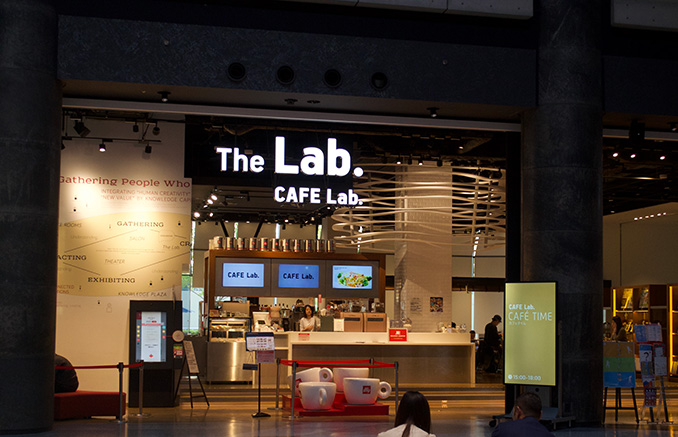
Tell me more about your career, step by step.
After college I was curious where to go. You don’t know, so you have to figure it out. What do you do? Internships. So I started with an internship at a bank. In Switzerland there’s not much. You have banking or chocolate – so I went with the banking haha. Wealth management area, not even the investment banking you see normally in Wolf of Wall Street and so on. It was a great experience, very interesting. From there, I had the opportunity to stay but I wanted to try something else I was always trying to get in being a creative person. Which was marketing . Those are the creative guys, they do these interesting things. That’s how I ended up in the marketing team of a pharmaceutical company, which actually turned out to be very difficult and not open as in other places. Creativity is very much limited by regulations, especially when you work with prescription based products. You are very much tied to some rules and laws. You cannot do that much. But still a great experience.
I still wanted to see more. I went back to the bank and joined a student graduate program. I knew the structure of the bank already, which helped me to get back in. Again in wealth management. First in business management for markets. Then I transferred to the innovation/research and development team. That was really cool because the bank itself was a global bank, a huge corporation. Everything ordered and hierarchical. The innovation team was out of all that – it had a separate office out of the main buildings. No suits. It was about creating a culture and the idea of being in this field of startups and also operating a little like one. We had our own approach in trying to push innovation culture in the company. From there I went a little bit back to the corporate area and worked on artificial intelligence related topics. These are all no secret, you can go on my LinkedIn and see for yourself.
That was the point I noticed, I actually like getting in touch with all these research and new technology driven areas with startups. It’s very dynamic. It’s not one topic. You have a routine in some ways but you are still confronted with different problems and different people. This was probably the entrepreneurship wake-up call for me, if you want to say it that way. After that I was already looking forward to Japan.
At some point I quit my job. Moved to Japan as a tourist looking for how to approach the situation. It’s very difficult to find a job as a foreigner without the language here in Japan. So through my connections in Kyoto and Osaka I started to go to events, meet more and more people, and engage as a volunteer at events like Hack Osaka. Support the social media team and photography – took pictures here and there. Just tried to get out of the house and to support people, because I like to be there, in that environment. I would just be around. After some time, you start to meet people that can show you some opportunities that eventually led to my position here now at Sunbridge Corporation working at the Global Venture Habitat in Osaka – supporting the Kansai startup ecosystem.
When I first met you almost exactly a year ago, that was the start of that process in Japan?
That was in winter 2016. Yeah, I quit my job at the end of September 2016. That’s when I came to Japan.
Did that make you nervous? Quitting and moving to a new country?
Both yeah, but I needed that. You know, as a startup or in the creativity or innovation areas it’s true – you have to leave your comfort zone to discover new horizons, or unlock your true creativity, or whatever you are looking for in that sense. It was scary, not because I didn’t trust Japan. I didn’t know the language but I had support from some friends. The biggest fear was literally that I would have to leave the country for good, if I could not find anything – because the idea was to stay, right.
I went back once end of December 2016 to Switzerland for visa reasons. I stayed with my family again and supported a startup of a friend. That was actually cool, it was a great experience and I could work on a yet different project and position.
And then it was already April 2017 and dangit I had nothing haha. Towards the end of April suddenly two opportunities opened up. I chose what made more sense to me. Both opportunities were very interesting. It was a tough decision. Now I’m officially working here at Sunbridge Corporation since June 2017.
Sunbridge is Sponsoring your visa? Tell me about that process.
Without the work visa, you are not allowed to work – it’s illegal. You might enroll in a student program and then you can work from 20% up to 30%? I don’t know I have to look up the exact figure. If you want to work full time, you have to reach a certain number of points in pointing system in order to qualify for a visa. Either you are a kind of already business-owner, or a high level engineer where you have some publications or research or something like this. Or, then you find someone who sponsors your visa. For me, I was really lucky in the sense that I have a lot of support in the current team. Plus the company that hired me is well established. From then, it’s still some hurdles to take. You have to go show all the terms and reasoning. They ask why the company doesn’t hire a local – you have to justify the hiring decision. Then I got a letter of eligibility. With that I applied actually outside of Japan in Switzerland – at the embassy of Japan – for a visa.
I see a lot of people struggling a lot. It’s very difficult depending on who’s supporting you, who’s the sponsor. A friend of mine. He applied one month before me, and he got his visa two months later than me, because it was a more difficult case. Ideally you have some family ties and they are your guarantors, and then it’s much easier to stay and work and live in Japan.
The working visa is tied to the workplace. If I quit or get kicked out, I have 3 months to find something else.
Are you familiar with the process of getting a Switzerland visa?
Not that much but it’s also not really easy. Very bureaucratic. From getting a citizenship aspect, the process in Switzerland is complicated and takes quite a while. I read that the only other country that may be as complicated is Japan. So there are some more similarities haha.
What is your goal in life?
How specific? To be happy? To have a purpose? I can get very philosophical especially after watching Blade Runner haha.
Haha let’s keep it focused on your career.
I was very career driven early on, because I was basically primed that way. I realized that ranks and names is not what makes me happy. Maybe this is a millennial issue, as they call it. Our generation seems not really to be career or status driven, but more purpose driven. I look for more opportunities where I can actually have an impact. It sounds very general, everyone says it – you want to have an impact, you want to help and support people – but not many figure out how to. In that sense, for now I would love to stay here in the Kansai Area, to support the people who actually want to do something. When I see others proceed through my help to new levels or achievements, that gives me a feeling of achievement as well. I don’t know if I ever want to start my own company. I thought about it but I enjoy more the process of entrepreneurship than being an entrepreneur itself. That’s why I like the position I have now.
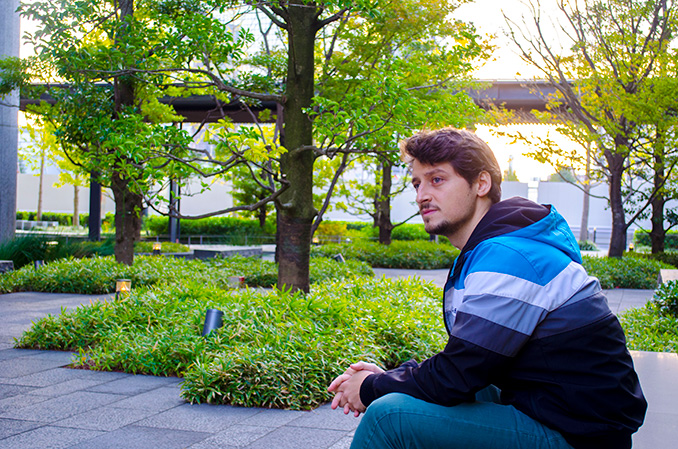
What do you think of entrepreneurship and startups in Japan and Kansai?
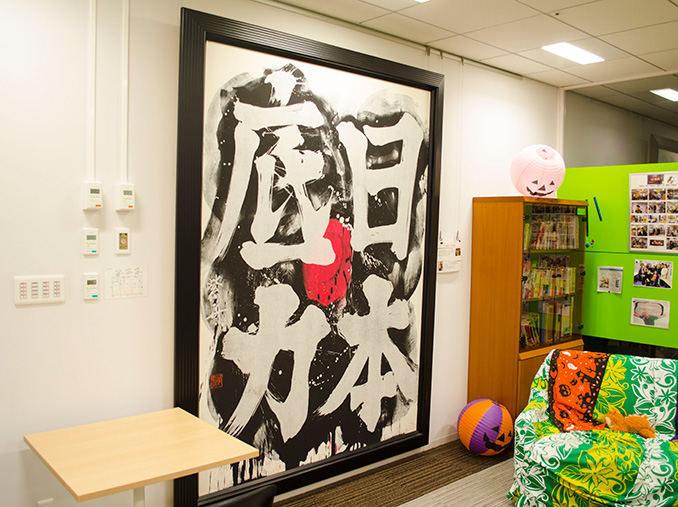
Ricky was talking about that a little bit. He was saying everybody’s doing their own thing. Everybody wants to be the leader, so they aren’t willing to work with other groups and communities.
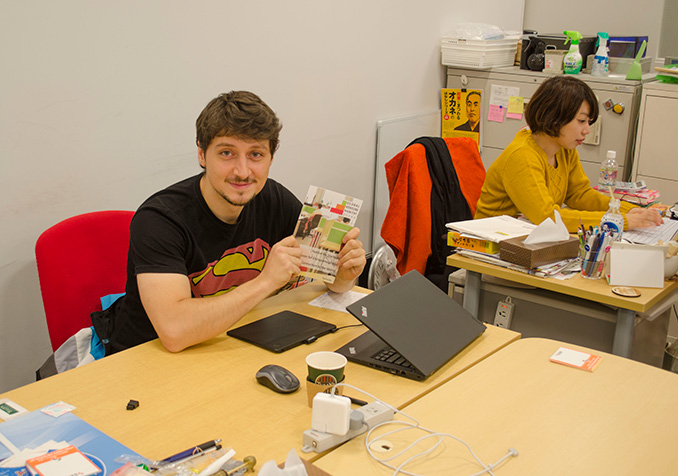
You have to be open for that. That’s actually the fun thing about entrepreneurship, right. That’s where you get the creativity and ideas. Different people from different companies sharing their learnings. There are of course work related contents you cannot share and you have to be reasonable and such. But the exchange is very important – cross pollination you know.
I see this here in Kansai, I don’t know how much it is in Tokyo. I hear Tokyo is a bit more open. A bit more international, in terms of work approach and work culture. Here in Kansai I feel it is more conservative. I see people, they want to protect their ideas, they want to be the leader of this one thing. I don’t know if it is on purpose, or it just comes out from the situation. I’m sure there is some social upbringing that makes them the way they are. It’s a complex matter. However, if you have like governments and companies starting initiatives and then being protective about it, they become gate keepers for the ecosystem and they block outsiders and even insiders. You have to know certain people to get to a point. I tweeted about it recently actually. The procedures in Japan in general are very relationship based. There are some dangers here. People have to open up a little bit more about that. But I don’t expect it to be the same explosion you have in Europe now, or of course in Silicon Valley. You come out of this culture, entrepreneurs and related people have to find ways to use the advantages and background of Japan to create an ecosystem suited for Japan, plus open up for global businesses – but that’s another topic. It’s a very difficult situation, very interesting. I expect a lot of changes in the next 5 to 10 years. There is a lot of potential.
Everyone’s always going to compare themselves to Silicon Valley, including Japan. I always try to think of it in terms of advantages and opportunities. In Silicon Valley, there’s a lot of money moving and a lot happening, but it’s also super competitive. Compare that to Japan, there’s a lot less competition, and that makes it that much easier for example to get funding.
That’s what I heard actually. Like you said, it’s actually easier in Kansai to get some funding than maybe in Tokyo. Even though there is not much money here compared to there, there are also a lot less entrepreneurs or startups.
The comparison with Silicon Valley, I try not to use that anymore. I like much more comparisons maybe to European places, like Germany or Finland from 5 to 6 years ago, when there was nothing yet. In Japan I also see one of the problems is if there actually is a big need for entrepreneurship here. I mean what’s the driving force? Yeah, you see some upcoming issues like the aging population and stuff. One of the good comparisons I had is the Finland one. That’s where the Slush event is from. What happened was the fall of Nokia, one of the largest companies there. That created an urge – people woke up and realized if they don’t do anything, then things will crumble. It’s also an opportunity. People see that it doesn’t always have to be the big companies pushing innovation, they see that they can do it themselves. You see some things happening in Japan but I don’t think it’s enough yet.
It would be both good and bad if for example Sharp or Panasonic just went bankrupt.
Haha right right. Well you had Toshiba which was kind of shaken. I’m not sure about the current state. Sharp was taken over by Foxconn, by the Chinese company.
If these companies failed spectacularly and was all over the news, it would shake everybody up and Japanese would be more willing to be entrepreneurial I guess. But then a lot of people would be out of a job which is bad of course..
So it is a little bit changing right. The idea of a lifetime employment.. You position is not secure anymore forever in the same company – with layoffs and stuff going on. There are actually already many freelancers in Japan, just doing their own thing and not relying on the old system.
Where do you see yourself going in the next 5 years?
It depends on what will happen next, but I would love to stay here. Would be great if we can advance things. I will try to move some mountains haha. The potential is here, we just have to find the right mix I would say – to support people in the way they need it.
Are you optimistic about entrepreneurship in Osaka?
With the people I met and know – yes. There are structures and companies that still have to adapt their mindset. But like I said in the next years, there might be more and more the situation of “change or.. die” – so they might open up.
Tell me your intentions with the videos you are making.
The startup system here is not so well connected. As we mentioned before. I hear from people that even in Japanese it is difficult to get to information, so in English it must be even harder. I’ve been trying to look around to find some outlets. There’s a need for more content to the outside world. In general about Japan – the Japanese culture and also about entrepreneurship here. To tell the people what is happening and how could they help and how they can engage. That’s why I started the video series and the podcast branded as #HabitatUpdate. I talk to local startups, people involved in entrepreneurship – tell their stories. I tell it a little bit from the perspective of a foreigner to give interested people around the globe a bit more information about the ecosystem here and how they could participate. I combine all that with cultural aspects and for instance talk about hardware manufacturing in Kyoto, food in Osaka, and so on.
Where can people find these videos, podcasts, and information? How can they find you?
Multiple ways. Ideally of course through the new website that is not up yet but will be up by mid-December. But we have a Facebook page for Global Venture Habitat. There I post the videos, once a month or 2 months – depending on how things work out. And with the podcast, I try to push an episode every 2 weeks. We have interviews and talks and everyone is welcome to approach me and become part of it in one way or the other..
Me myself you can find me on Facebook or on Twitter.
If I gave you $1million right now, what would you do with it?
Invest. Boring answer haha. The cooler answer is invest in local startups.
Oh right you have a banking background.
Haha yeah let your money work for you and all that. I don’t think I would be here if I were after money. It would be great to have it haha. I could support people in more ways. That brings me to one thing I realized. People need to be more selfless. Not only in Japan but in general. Just go out and help others. Don’t look for what benefits you can get out of it. The benefit will come to you at some point without you realizing. I mean like as for an ecosystem, if you help others you help yourself as well. It’s all about working together.
Any last points?
Just get out there and do something.. anything, just try and create content. Trial and error. I have been quoting a lot of buzz words here but you know they from somewhere. Here one more build-measure-learn. Don’t over engineer ideas. Of course you shouldn’t deliver shitty stuff, but start with something, see what the feedback is, and change, adjust and improve in a next step. This can be applied to everything that you do in your life. And don’t be afraid to ask for help.
The way Tugi talked about startup ecosystems seemed to somehow connect with his studies and interests in biology systems – at least to some degree. He mentioned cross pollination, our talks about big corporations failing could relate to evolution and natural selection, and also the constant reference to ecosystems. Coincidence, simply a framework of thinking, or whatever it may be – Tugi uses his knowledge and experiences to do what he can to help this particular ecosystem thrive. I’m excited to see what the Osaka startup ecosystem grows up to be.

Leave a Reply